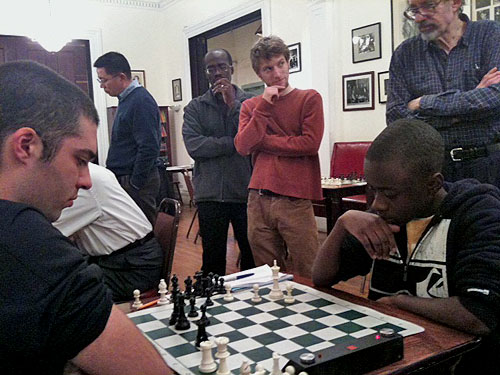Saturday, December 29, 2012
Silly Internet Game No. 1048
This King's Gambit concludes with a sacrificial flurry. Had Black played 24...fxg6, 25.d6+ would have mated quickly; ditto with 24...Bg7 25.Rxg7+ Kxg7 26.Nxf7+. Incidentally, in the opening 5.e5 Nd5 6.Bc4 was better than my 5.d5, when Black would have been OK after 5...Ne7. On move 16, Houdini 3 points out the powerful shot 16.Nxf7! with a winning advantage.
A trap in the King's Gambit
In the King's Knight's Gambit (1.e4 e5 2.f4 exf4 3.Nf3), 3...h6 intending 4...g5 is a respectable line. 3...f6 with the same idea doesn't work so well. This game duplicates Trap No. 133 in Irving Chernev's book Winning Chess Traps, except that in that game Black played 3...g5 and 4...f6?
Thursday, December 27, 2012
A solar system without a sun
 |
| Source: The Chess Drum |
I'd like to ask you to imagine a young chess player who attends a Chicago public school. Maybe the school has a coach provide after-school lessons one day a week; maybe not. Regardless, this young player shows promise and drive and would like to be able to get the same kind of practice and participate in the same kinds of competitive opportunities as the champs in Brooklyn Castle. Unfortunately, 90 percent of all competitive chess activity in the Chicago area takes place in the suburbs -- places like Northbrook, Wheeling and Oak Lawn -- and the player's school and family are unable to provide the necessary transportation to these events. If there were a club in the city, comparable to the Marshall, that offered opportunities to practice and receive structured guidance from experienced players, this player would at least have that chance. But the last such club in Chicago shut its doors 22 years ago.
Are you aware that out of the top 10 urban areas in the United States, Chicago is today the only one without a primary metropolitan chess club? The Chicagoland chess scene is like a collection of planets orbiting a large void where a star used to be -- and city residents of all ages and backgrounds are missing out on the benefits and pleasures of chess as a result.
We want to restore Chicago's place among America's great chess cities and revive the tradition that was lost with the dissolution of the Chicago Chess and Checker Club and our namesake, the original Chicago Chess Center. But we're not creating just another club: the new Chicago Chess Center will be a school of chess, a destination and gathering place, and the focus of a vibrant and expanded chess scene.
Donate now so that we can open our doors on our target date of May 1, 2013.
You may already know about how young people benefit from chess: not only in the logical reasoning skills that chess imparts but also in the "soft skills" of patience, attentiveness, self-discipline, conflict management, sportsmanship, and connecting effort and practice with success. But experience shows that chess is also part of a well-rounded, healthy lifestyle for adults -- like a gym workout for the mind. Your donation will allow us to begin offering classes, tournaments and open play to residents young and old across the city of Chicago.
Click here to make your tax-deductible donation before Dec. 31, 2012 -- or, if you're waiting until 2013 to make donations to charities, send us an e-mail pledging the amount you'll give before Jan. 18.
 Sincerely,
Sincerely,Keith Ammann
President, Chicago Chess Center NFP Inc.
P.S. We're off to a great start . . . and we have a long way still to go. You can help us raise the $30,000 we need to secure and furnish a site by clicking here now. Thank you for your support.
Tuesday, December 25, 2012
Never say die!
The shortest decisive master game that wasn't a forfeit or protest is Z. Đorđević–M. Kovačević, Bela Crkva Open 1984, which went 1.d4 Nf6 2.Bg5 c6!? 3.e3?? Qa5+! (winning a bishop) and White resigned. In the 28 years since then, a number of other players have fallen into this trap. ChessBase's Mega Database 2013 shows 12 complete games with this line. Surprisingly, Black scored only 83.3%! He actually managed to lose the following game, letting his queen be trapped with 15...f6?? instead of saving it with 15...Qf6!
The moral of the story: "won games" don't win themselves! When you get a winning position, play accurately and finish your opponent off. By the same token, if you have a losing position, don't give up. Keep the position complicated and set your opponent as many problems as possible. My Wikipedia article on swindles has some inspiring examples of saves from seemingly hopeless positions.
Subscribe to:
Comments (Atom)
